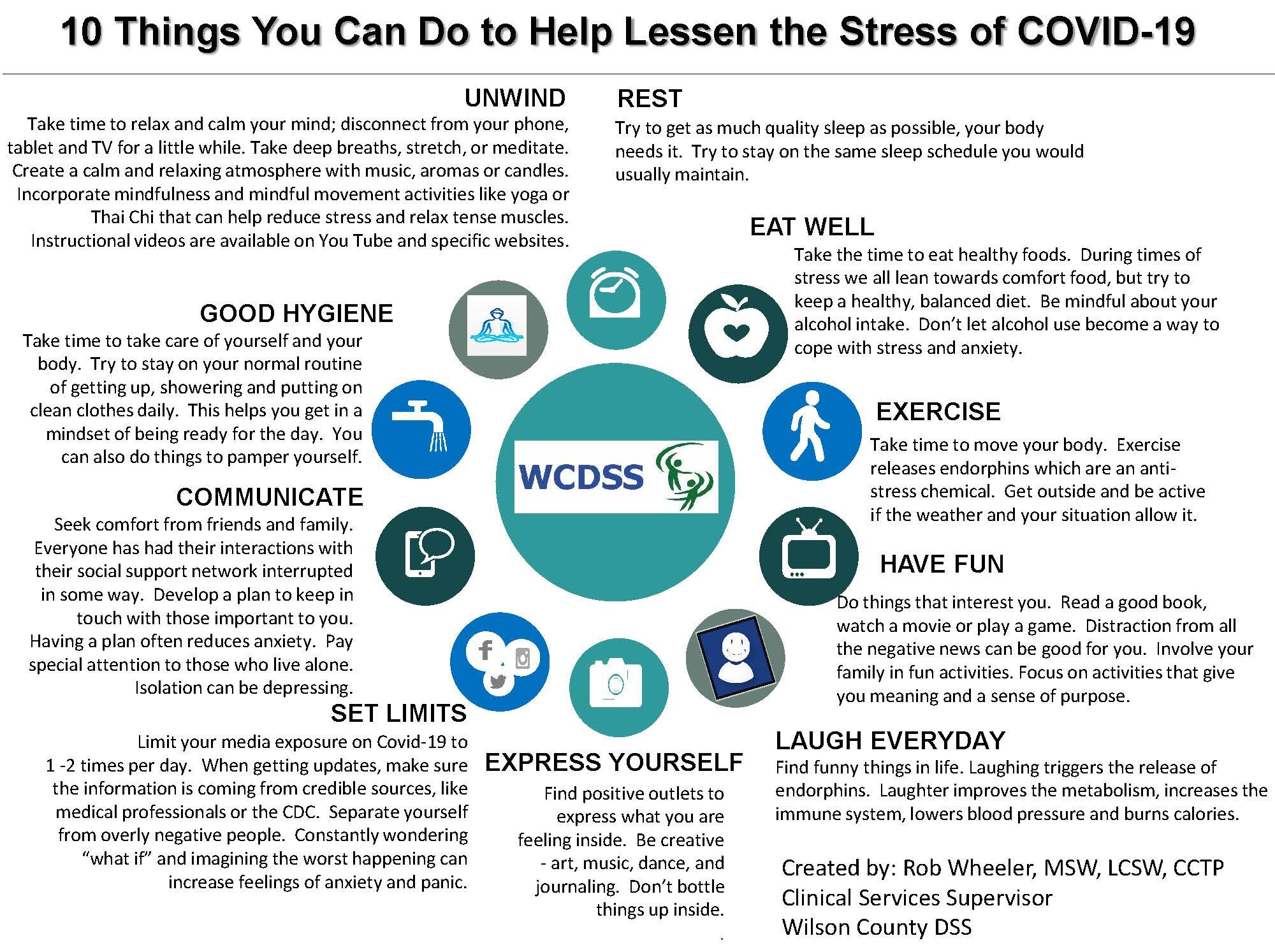Rob Wheeler, MSW, LCSW, CCTP
Clinical Services Supervisor at Wilson County DSS
10 things you can do to help lessen the stress of COVID-19:
1. Rest – Try to get as much quality sleep as possible, your body needs it. Try to stay on the same sleep schedule you would usually be on.
2. Eat well – Take the time to eat healthy foods. During times of stress we all lean towards comfort food, but remember to try to keep a healthy balanced diet. Be mindful about how your alcohol intake. Don’t let your alcohol use become a way you cope with your stress and anxiety.
3. Exercise – Take time to move your body. Exercise releases endorphins which are a anti-stress chemical. Get outside and be active if the weather and your situation allows it.
4. Have fun – Do things that interest you. Read a good book, watch a movie or play a game. Distraction from all the negative news can be good for you. Involve your family in fun activities if they are in the home with you. Focus on activities that give you meaning and a sense of purpose.
5. Laugh everyday – Find funny things in life whether it be movies, friends or situations. Laughing triggers the release of endorphins. Laughter improves the metabolism, increases the immune system, lowers blood pressure and burns calories.
6. Express yourself – Find positive outlets to express what you are feeling inside. Be creative - art, music, dance, and journaling. Don’t bottle things up inside.
7. Set limits – Take breaks from watching, reading, or listening to news stories, including social media. Limit your media exposure about Covid-19 to 1 -2 times per day. Hearing about the pandemic repeatedly can be upsetting. When getting updates on the virus, make sure the information is coming from credible sources like medical professionals and the CDC. Separate yourself from overly negative people or people who think the worst. Constantly wondering “what if” and imagining the worst happening will increase feelings of anxiety and panic.
8. Communicate - Seek comfort from friends and family. Most everybody has had their interactions with the social support network interrupted in some way. Develop a plan of how you can keep in touch with those important to you. Having a plan often reduces anxiety. Pay special attention to those who are living alone. Isolation can be depressing. Brainstorm creative ways on how you can remain in contact with others but at a safe distance.
9. Good hygiene – Take time to take care of yourself and your body. Try to stay on your normal routine of getting up, getting showered and putting on clean clothes daily. This helps you get in a mindset of being ready for the day. You can also do things to pamper yourself.
10. Unwind – Take time to relax and calm your mind; disconnect from your phone, tablet and TV for a little while. You can take deep breaths, stretch, or meditate. Create a calm and relaxing atmosphere with music, aromas or candles. You can incorporate mindfulness and mindful movement activities into our life like yoga or Thai Chi. These can help reduce stress and relax tense muscles. A lot of instructional videos are available on You Tube and specific websites.
Parenting during Covid-19 and social distancing
Keep in mind that children look to their parents to know the importance and severity of things. The more calm and relaxed you are around and with them, the calmer and relaxed they will be. Conversely, the more anxious and panicked a parent is, the more stressed and upset their child will feel.
Family discussions about the virus can be helpful. Find out what they know and what they are hearing. Encourage them to ask questions and help clarify factual information. Younger children may benefit from separate conversations so it can be put in language they understand.
Talk with children about their feelings and validate them. Use extra patience with them during this time. Their routines and social connections have all been altered too. Help them understand that having anxious or angry feelings is ok and that it’s important to talk about them.
Check in regularly with your children and keep them engaged in fun activities. Help them find creative ways to stay in touch with their friends and family. Limit their exposure to media exposure about the virus.
